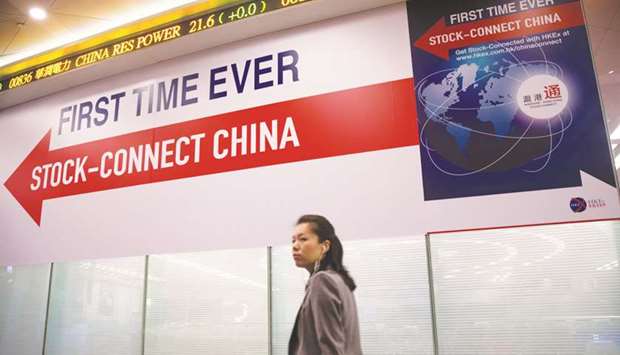In the seven months since China started a trading link between Hong Kong and Shenzhen, the top purchases of overseas investors have been Hangzhou Hikvision Digital Technology Co, Gree Electric Appliances and Midea Group Co.
Each of the three has risen more than 50% this year, as the Shenzhen Composite Index retreated 6% – one of the world’s worst performances in a year of record highs for many equity gauges.
With such big surges, analysts are warning about excessive valuations on the three. Other hurdles loom for investors in the final months of the year, including a potential economic slowdown and a once-in-five-years senior leadership gathering of the Communist Party.
“The buying was a little bit irrational – they are good stocks, but investors may have priced in too much earnings upside,” said Zhang Gang, a Central China Securities Holdings strategist based in Shanghai.
Overseas investors have purchased a net 104bn yuan ($15.4bn) worth of stocks listed in the technology hub of Shenzhen as of Monday, since the trading link enabled them to buy the city’s stocks in December.
“Those stocks were little favoured by local individual stocks before the Shenzhen connect, but they have become stock- market darlings after foreign investors came in,” said Chen Li, Hong Kong-based strategist at Credit Suisse Group AG.
Hangzhou Hikvision makes video-surveillance products and is seeking to tap the growth of AI in China. Its net profit reported last Friday missed analysts’ consensus for the third consecutive quarter, according to data compiled by Bloomberg. Its shares trade at 34 times earnings, the highest since June 2015.
Billy Feng at UBS Group downgraded the stock to a sell this month, his second cut in less than four months. Current valuation suggests at least 35% earnings growth in the coming three years, a challenging outlook given slower China growth and rising competition, Feng said.
Midea, one of the world’s largest consumer appliance makers and famous for its purchase of German robot maker Kuka, trades around the highest levels in at least three years for its price-to-earnings ratio. Gree, which makes air-conditioners, also has a PE ratio near a seven-year high and trades around its most expensive ever against the Shenzhen Composite Index.
Hangzhou Hikvision rose 0.2% yesterday. Midea was unchanged, while Gree retreated 0.7%. Challenging valuations aren’t a problem for everybody.
“These companies managed to establish their domestic champion positions and they will continue to strengthen their competitive advantage, leveraging their size,” said Francois Perrin, portfolio manager at East Capital Asia in Hong Kong. “For long-term investors, they offer a safe access to the second-largest equity market in the world.”
But others say it’s time to hold off. Bruce Yu, a fund manager at Franklin Templeton Sinoam Securities Investment Management in Taiwan who holds Shenzhen-listed shares, said investors should only consider buying the three companies if their Price/Earnings to Growth ratio ratios go below 1.
The PEG ratio compares a stock’s PE multiple with its projected profit growth rate. Gree’s current PEG is under 1, Midea is 9.84 and Hikvision is 1.2, according to data compiled by Bloomberg.

